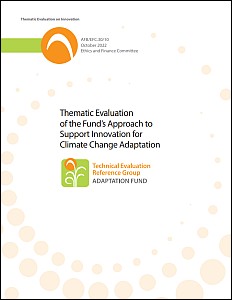Thematic evaluations of Fund performance will provide perspectives on core features of the Fund, such as the country driven and innovative character of Fund operations with a view to assessing the potential for scale up and longer-term impact. Based on extensive consultation processes the currently commissioned thematic evaluations are:
- The Fund’s Approach to Support Innovation for Climate Change Adaptation;
- Scalability in the Fund, and;
- Accreditation and Related Readiness in the Fund.
Other topics identified are knowledge management and learning, and the efficiency of Fund processes.
Thematic Evaluation on Innovation
Thematic Evaluation of the Fund’s Approach to Support Innovation for Climate Change Adaptation
 The Thematic Evaluation of the Fund’s approach to support innovation for climate change adaptation has found that the Innovation Facility established by the Fund shows some promising and initial signs of impactful support to adaptation-related innovations, though overall, the progress made since its launch falls short of both its stated ambition and potential contribution.
The Thematic Evaluation of the Fund’s approach to support innovation for climate change adaptation has found that the Innovation Facility established by the Fund shows some promising and initial signs of impactful support to adaptation-related innovations, though overall, the progress made since its launch falls short of both its stated ambition and potential contribution.
The operationalization of the Innovation Facility has been delayed for various reasons. The evaluation identified a range of barriers (both internal and external) to realizing the Fund’s innovation-related vision and strategic objective. Such barriers are not likely to be resolved only by spending more time on the current trajectory.
Consequently, this document highlights seven areas of improvement and potential actions in which the Fund should invest to enhance the impact of its support to adaptation-related innovations.
Thematic Evaluation on Scalability
 The Thematic Evaluation of Scalability Concepts and Practice of the Adaptation Fund assesses the experience of the Fund in applying the concept of scalability as well as examples of climate change actions that have achieved scalable impacts. It has found that there is currently no uniform definition of scaling or scalability across the Fund. However, the Second Medium-Term Strategy (MTSII) and its implementation plan have elements and proposed activities that can support the outcome of enabling scalability, including the scaling-up framework that is currently under implementation between the Fund and Green Climate Fund.
The Thematic Evaluation of Scalability Concepts and Practice of the Adaptation Fund assesses the experience of the Fund in applying the concept of scalability as well as examples of climate change actions that have achieved scalable impacts. It has found that there is currently no uniform definition of scaling or scalability across the Fund. However, the Second Medium-Term Strategy (MTSII) and its implementation plan have elements and proposed activities that can support the outcome of enabling scalability, including the scaling-up framework that is currently under implementation between the Fund and Green Climate Fund.
While selected Fund-supported projects have been scaled up using multilateral funds, the number of these projects relative to the portfolio size is limited. But project elements have also been scaled up in subsequent projects supported by the Adaptation Fund and other agencies. Projects may also overlook non-financial support of scaling. Although not currently used under the Fund’s mandate and operations, non-grant instruments can further support the mobilization of adaptation finance at scale.
On the basis of these findings, this document lays out seven recommendations in the areas of Fund Strategy and Programming on Scaling; Types of Scaling, Understanding of Scaling; Financial and Non-Financial Pathways and Instruments for Scaling, and Evaluation to encourage and enable the scaling of results.
Thematic evaluation on Accreditation
 Accreditation enables developing country to access financial resources for climate adaptation projects, serving as a means for Implementing Entities (IEs) to demonstrate their capacity to adhere to administrative and financial guidelines. The Adaptation Fund was the first climate fund to introduce the “direct access” modality as part of accreditation, which broadens the range of IEs to include NIEs nominated by individual Parties. The Thematic Evaluation of the Adaptation Fund Accreditation Process assess the relevance, effectiveness and efficiency of the accreditation and re-accreditation processes at the Fund and assess the coherence and complementarity between the Adaptation Fund and the Green Climate Fund accreditation processes through the fast-track modality. The evaluation provides perspectives on accreditation as one of the core features of the Fund and recommendations for potential improvements. It covers the period of March 2008 to October 2023.
Accreditation enables developing country to access financial resources for climate adaptation projects, serving as a means for Implementing Entities (IEs) to demonstrate their capacity to adhere to administrative and financial guidelines. The Adaptation Fund was the first climate fund to introduce the “direct access” modality as part of accreditation, which broadens the range of IEs to include NIEs nominated by individual Parties. The Thematic Evaluation of the Adaptation Fund Accreditation Process assess the relevance, effectiveness and efficiency of the accreditation and re-accreditation processes at the Fund and assess the coherence and complementarity between the Adaptation Fund and the Green Climate Fund accreditation processes through the fast-track modality. The evaluation provides perspectives on accreditation as one of the core features of the Fund and recommendations for potential improvements. It covers the period of March 2008 to October 2023.
The evaluation has found that with the accreditation process, the AFB Secretariat has put in place a functioning system that fulfils its purpose of facilitating broader access to climate finance resources. The Fund is in the position of a trailblazer on direct access and as a leader and role model among the climate funds. However, the evidence also shows that the system has its limitations including in its speed.
On the basis of these findings, this document lays out seven recommendations related to the following: climate rationale; Fund Operational Policies and Guidelines (OPG); Capacity assessment and readiness support; Pipeline management; Fast-track re-accreditation; Reviewing processes; and Differentiation of accreditation requirements.


